29 Oct 2014 | Azerbaijan, Azerbaijan News, News and features
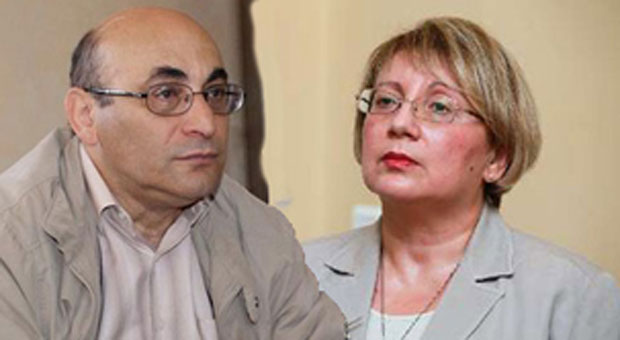
Arif and Leyla Yunus (Photo: HRHN)
A journalist from Azerbaijani opposition newspaper Azadliq was today sentenced to 25 days of administrative detention. Khalid Garayev, who also hosts online show Azerbaijani Hour, was found guilty of hooliganism and insubordination to the police by a court in the capital Baku. He told the court the case against him is “fabricated, and politically motivated” because of his “journalistic activities and active civil position” reports contact.az.
Also today, jailed human rights activist Leyla Yunus said she has been denied access to her lawyer. Yunus made the claim in a letter sent from the detention centre in Baku where she is being held. This comes a day after her husband Arif Yunus, who was arrested with her in July, had his pretrial detention extended until 5 March, 2015. Azerbaijani authorities also announced yesterday that police will be able to use electric shockers, following an amendment to the police law.
Leyla Yunus’ lawyers have previously reported being denied access to her cell or an opportunity to see her. She has also reportedly been beaten and denied medical attention. The lawyers say the conditions she is being exposed to in prison “raise a lot of concerns”.
In addition to the Yunus couple, rights activist Rasul Jafarov, lawyer Intigam Aliyev and journalist Seymur Hezi have been detained since late this summer.
Last week, the European Union praised an announcement from President Ilham Aliyev that 80 prisoners, including at least four activists, would be granted amnesty. This was “a positive first step in reversing the trend of recent months,” said the EU in a statement.
Previously, the European Parliament has called on Azerbaijan to release political prisoners, including Arif and Leyla Yunus. The parliament also called on the government to cease its harassment of civil society organisations, opposition politicians and independent journalists.
On 13 October, thousands protested in Baku, calling for the resignation of President Ilham Aliyev, the release of political prisoners and an end to human rights abuses in the country. Two days prior, a travel ban had been placed on journalist Khadija Ismayilova. She currently faces a lawsuit over libel and document forgery, accusations she denies. As Index has reported, government supporters have threatened Ismayilova in the past.
Fellow journalist Arzu Geybulla was threatened on social media and accused of treason following a recent interviewed with Azerbaijani news site Modern.az. In July, the Index award-winning newspaper Azadliq was forced to suspend publication due to financial pressure from authorities.
Nominations are now open for the Index Freedom of Expression Awards 2015. Put forward your free expression heroes here.
This article was posted on 29 October 2014 and updated on 30 October at indexoncensorship.org
16 Oct 2014 | Azerbaijan, Azerbaijan Statements, Campaigns, Statements

The Azerbaijani authorities should immediately lift the travel ban imposed on Khadija Ismayilova and cease all legal proceedings against her. Against the backdrop of the unprecedented crackdown on civil society, Khadija Ismayilova’s arrest on criminal defamation charges seems imminent and would confirm the authorities’ intent to silence all critical voices in the country.
As part of the International Partnership Group on Azerbaijan (IPGA), APC, ARTICLE 19, the Committee to Protect Journalists, Index on Censorship, the European Federation of Journalists, Freedom House, Freedom Now, the Human Rights House Foundation, International Media Support, the Media Diversity Institute, PEN International and Reporters without Borders, call on the international community, and in particular Council of Europe member states to immediately and publicly condemn the ongoing harassment and politically motivated criminal charges against Khadija Ismayilova. With the next court hearing taking place on Friday 17 October, at 11.30 in Binagadi district court in Baku, Council of Europe member states should publicly request to attend and send a representative to monitor the hearing.
IPGA members believe that Khadija Ismayilova’s attendance at the most recent session of the Parliamentary Assembly of the Council of Europe (PACE) in Strasbourg triggered the latest string of harassment, including a five hour search upon arrival at the airport following her trip, the criminal defamation charges and the imposition of a travel ban.
“Those who raise concern about the existence of political prisoners in Azerbaijan at the Council of Europe are themselves specifically targeted by the authorities, and such reprisals are incompatible with international human rights standards the Azerbaijani authorities claim to adhere to,” said David Diaz-Jogeix, Director of Programmes of ARTICLE 19.
“The ongoing harassment of one of Azerbaijan’s most outspoken critics follows an unprecedented wave of arrests of human rights defenders, civic activists and journalists in Azerbaijan who have dared to publicly criticise the authorities. Those who have spoken about the issue of political prisoners in Azerbaijan at PACE have been particularly targeted.” said Florian Irminger, Head of Advocacy and Geneva Office at the Human Rights House Foundation (HRHF).
“We are deeply concerned by the increasing persecution of human rights defenders in Azerbaijan and, in particular, continued attempts to stifle free expression through intimidation and harassment of journalists like Khadija Ismayilova and Arzu Geybulla. The international community – and especially the Council of Europe of which Azerbaijan is part – needs to speak out loudly and firmly against the crackdown in Azerbaijan,” stated Jodie Ginsberg, CEO of Index on Censorship.
“Khadija Ismayilova is one of the most recognized investigation journalists in Azerbaijan. Harassing her is sending a clear signal of intimidation to the entire media profession,” Reporters Without Borders deputy programme director Virginie Dangles said.

These six human rights defenders, pictured above from left to right here are:
Zohrab Ismayil: forced to leave Azerbaijan, his NGO, Public Association for Assistance to Free Economy, paralysed
Emin Huseynov: unable to work in Azerbaijan, due to legal action against his NGO, Institute for Reporters Freedom of Safety, subject to travel ban
Gulnara Akhundova: forced to leave Azerbaijan, no longer able to represent her NGO, International Media Support from within the country
Rasul Jafarov: in pre-trial detention on politically motivated charges
Intigam Aliyev: in pre-trial detention on politically motivated charges, unable to take his cases at the European Court for Human Rights forward
Rashid Hajili: forced to stop working as human rights defender, his NGO, Media Rights Institute seized operating
The IPGA calls on the Azerbaijani authorities to cease its harassment of Khadija Ismayilova and stop the silencing of its critics through imprisonment and politically motivated legal actions. Member states of the Council of Europe, the main human rights institution in Europe, need to speak up and hold Azerbaijan to account for failing to implement its human rights obligations. With Azerbaijan as chair of its Committee of Ministers until 14 November, the integrity and accountability of the institution is at stake.
For further information about Khadija Ismayilova, also see the recent IPGA report Azerbaijan – when the truth becomes a lie.
13 Oct 2014 | Azerbaijan, Azerbaijan News, Europe and Central Asia, News and features
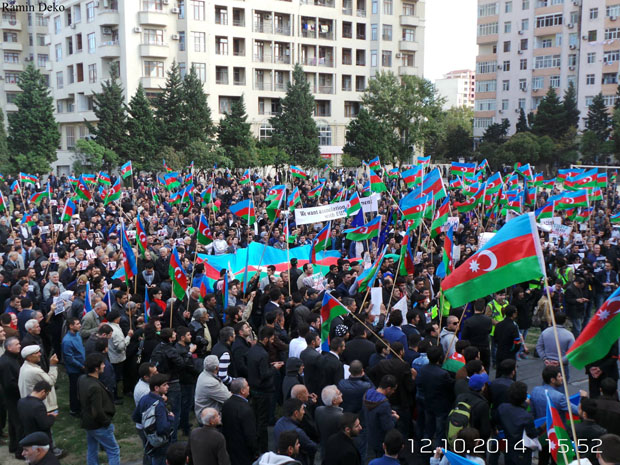
Thousands of Azerbaijanis took to the street on Sunday, calling for the resignation of President Ilham Aliyev, the release of political prisoners and an end to human rights abuses in the country. The protest comes during an ongoing and wide reaching crackdown on regime critics.
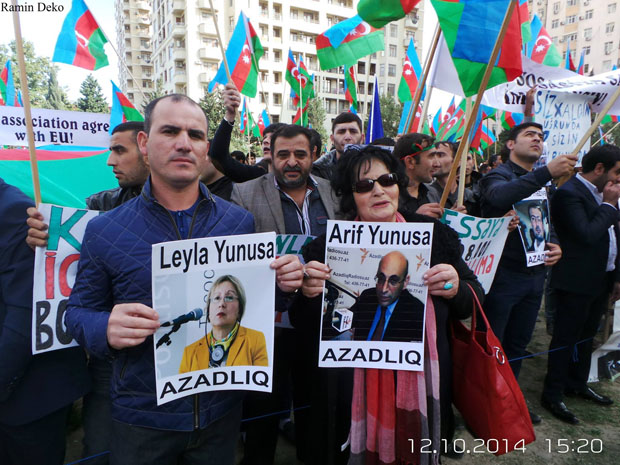
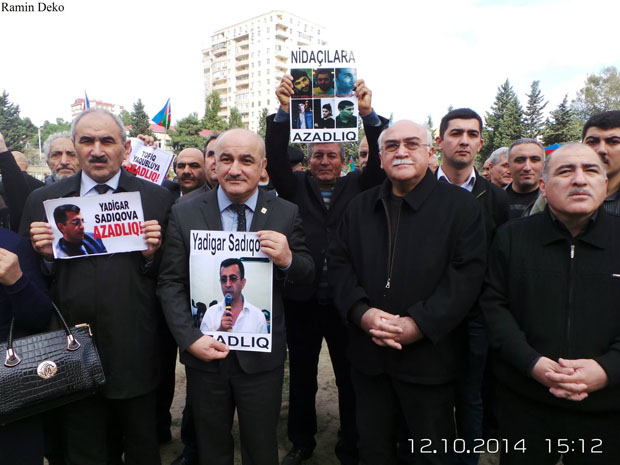
On Saturday, investigative journalist Khadija Ismayilova was placed under a travel ban. The award-winning reporter has covered corruption allegedly connected to Aliyev, and has been targeted by government supporters in the past. She is currently facing criminal charges of libel and document forgery, which she denies and vows to fight.
Last week, Index reported journalist Arzu Geybulla being threatened on social media and accused of treason after being interviewed by Azerbaijani news site Modern.az.
These cases follow the jailing of several prominent and critical voices within Azerbaijan’s civil society. Human rights defender Leyla Yunus and her husband Arif were detained in July, followed by fellow rights activist Rasul Jafarov, lawyer Intigam Aliyev and journalist Seymur Hezi.
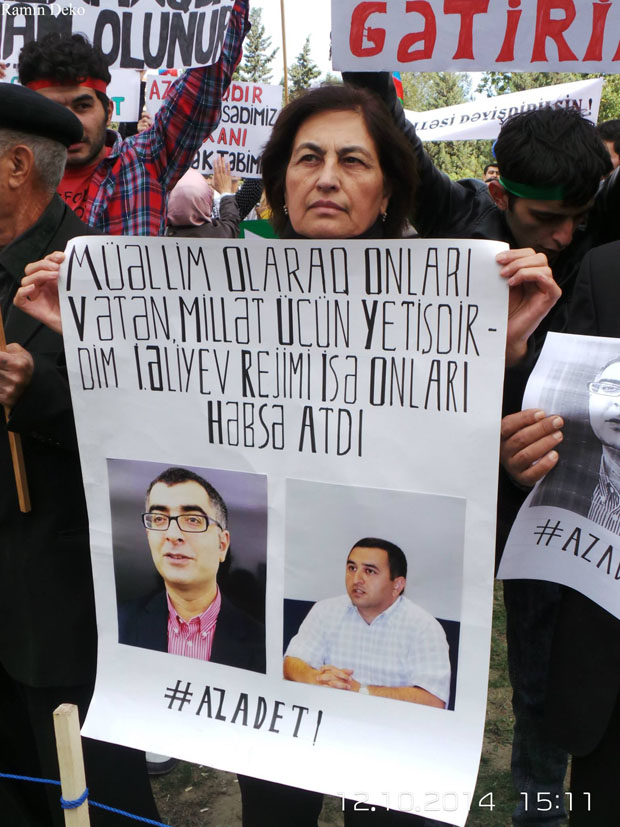
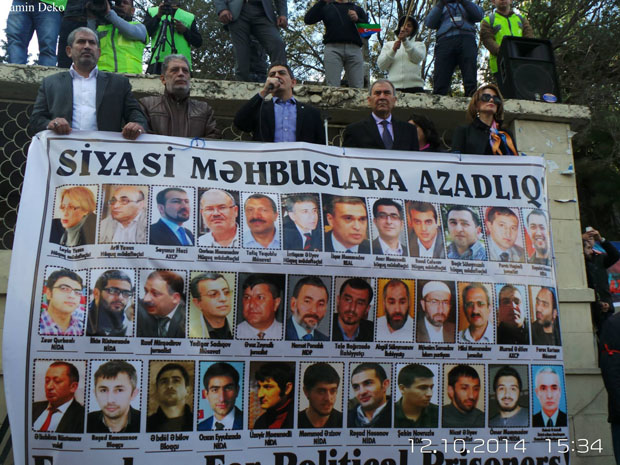
The European Parliament recently called on Azerbaijan — currently chairing the Council of Europe — to release several prominent political prisoners and proceed with reforming the country’s human rights policies. Before being arrested, Jafarov had worked on putting together a detailed list of the country’s political prisoners, with the latest figure coming to 98.
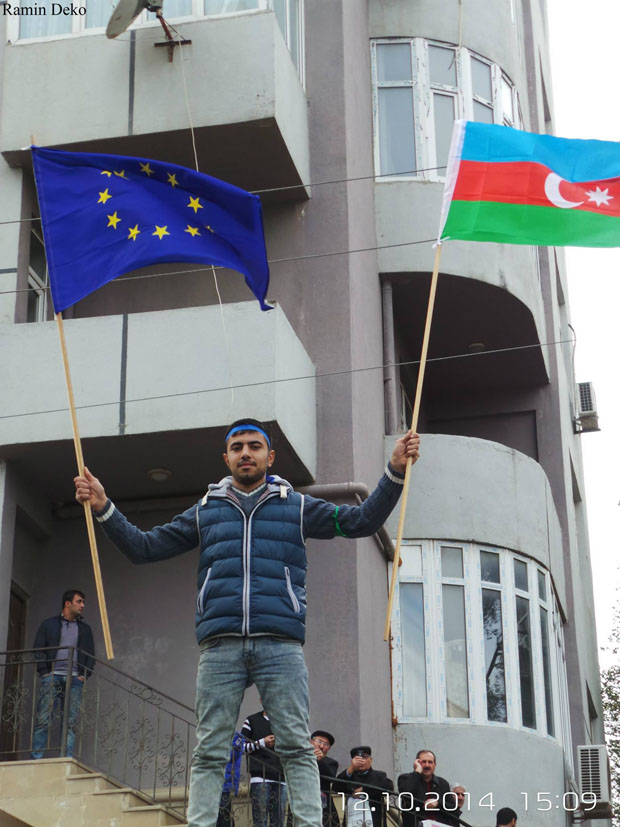
The protest, which also called for closer ties to the European Union, was approved by authorities, but took place in a remote part of Baku.
All photos by Ramin Deko
This article was posted on 10 October 2014 at indexoncensorship.org
17 Sep 2014 | Azerbaijan, Azerbaijan News, News and features, United Kingdom

London-based daily newspaper Metro ran a feature this month extolling the delights of Baku, the capital of Azerbaijan. The photo-driven feature article comes at a time when the government of President Ilham Aliyev is ratcheting up pressure on dissenters, including denying independent news outlets the kind of freedoms that a paper such as Metro, whose parent company is outspoken on the importance of press freedoms, enjoys in the UK.
Despite attempts to present itself to the outside world as a modern and open society — in part through a concerted international PR campaign — Azerbaijan has a woeful human rights record and continues to arrest, detain and harass any opponents to the regime of President Ilham Aliyev. In the last few months, many campaigners and activists have been arrested in an attempt to silence them.
Metro highlighted 10 things to do in Baku. Here we list just five things you need to know about Azerbaijan before you go. We ask our supporters and all those who care about a free press and free expression to draw attention to these so we can counter the whitewash of the Aliyev regime.
There is an ongoing crackdown on government critics

A number of high profile Azerbaijanis known for their criticism of authorities have been jailed in a matter of weeks. These include human rights activists Leyla and Arif Yunus and Rasul Jafarov, human rights lawyer Intigam Aliyev and journalist Seymur Hezi. This new wave of repression followed the jailing of two human rights defenders who lead the only independent group monitoring elections in Azerbaijan.
Independent media is silenced
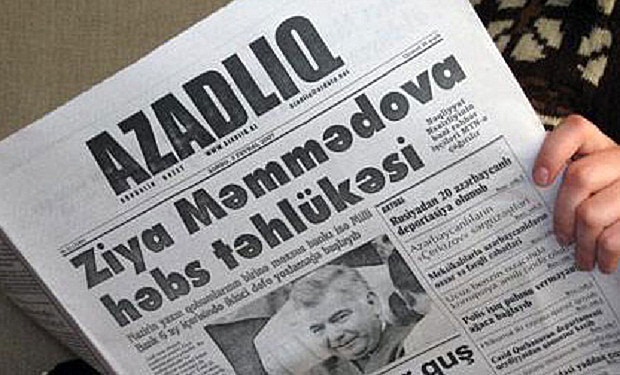
Azerbaijan’s last independent newspaper Azadliq, which was named 2013 Guardian Journalism award winner at the Index Freedom of Expression awards in March 2014, was forced to suspend printing in July because of financial pressures from the government. This is a familiar pattern for Azerbaijan’s critical press, which has long been subjected to an array of attacks. Independent news outlets face economic sanctions and are often barred from distribution networks. Journalists are also victim to legal threats. In the first six months of 2013, 36 defamation suits were brought against media outlets or journalists. Award-winning investigative journalist Khadija Ismayilova was subjected to an aggressive smear and blackmail campaign in retaliation for her coverage of government corruption and continues to be targeted by authorities.
Internet users are targeted
Ahead of last year’s election Azerbaijan extended penalties for criminal defamation and insult to cover not just traditional media, but also online content, including social networks. The potential length of pre-trial detention has increased from 15 to 90 days. In May, a university student and member of the Free Youth organisation, was arrested for a Harlem Shake video posted on YouTube. A human rights defender was sentenced to four years in jail on hooliganism charges after posting videos on YouTube containing interviews with victims of a gang they alleged had connections to local police officers. A freelance journalist who was outspoken in his criticism of the government on social media was given a four-and-a-half-year prison sentence on charges that included appealing for mass disorder.
Artists are censored
Despite the fact that Azerbaijan has committed to respect and protect artistic freedom of expression, authorities restrict this right. This is especially the case for alternative artists and those deemed to be critical of the government, whose ability to perform, display, or disseminate their work is limited. Self-censorship is one consequence of this, with many artists shying away from producing critical or controversial work for fear of the possible consequences. Musician Jamal Ali, who has spoken out against President Aliyev, was allegedly tortured by the police.
Democratic principles are ignored

Current president Aliyev has been in power since 2003, when he took over from his father Heydar, and in 2009 he removed term limits for the presidency. According to the international observer mission, the October 2013 election “was undermined by limitations on the freedoms of expression, assembly and association”, with “significant problems” observed throughout election day. The 2003 and 2008 votes also failed to meet international standards. Transparency International has called Aliyev’s government the most corrupt in Europe. Meanwhile, authorities have engaged in a wide-reaching international PR campaign. In 2012, the country was given a chance to project a positive image to the world through hosting the Eurovision Song Contents. Preparations included urban renewal programs that saw homes demolished and families evicted. It remains to be seen what will happen next year, when the inaugural European Games come to Baku.
This article was published on Wednesday 17 Sept 2014 at indexoncensorship.org













